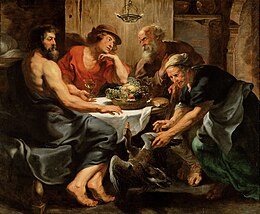
Back Xenia (Grècia) Catalan Gæstevenskab Danish Ξενία (αρχαία Ελλάδα) Greek Ksenio Esperanto Xenía Spanish קסניה HE Xenia (Görögország) Hungarian Xenia (antica Grecia) Italian 크세니아 (친절) Korean Xênia Portuguese

Xenia (Greek: ξενία) is an ancient Greek concept of hospitality. It is almost always translated as 'guest-friendship' or 'ritualized friendship'. It is an institutionalized relationship rooted in generosity, gift exchange, and reciprocity.[1] Historically, hospitality towards foreigners and guests (Hellenes not of your polis) was understood as a moral obligation. Hospitality towards foreign Hellenes honored Zeus Xenios (and Athene Xenia), patrons of foreigners.[2]
The rituals of hospitality created and expressed a reciprocal relationship between guest and host expressed in both material benefits (e.g. gifts, protection, shelter) as well as non-material ones (e.g. favors, certain normative rights). The word is derived from xenos 'stranger'.
The Greek god Zeus is sometimes called Zeus Xenios in his role as a protector of strangers. He thus embodied the moral obligation to be hospitable to foreigners and guests. Theoxeny or theoxenia is a theme in Greek mythology in which human beings demonstrate their virtue or piety by extending hospitality to a humble stranger (xenos), who turns out to be a disguised deity (theos) with the capacity to bestow rewards. These stories caution mortals that any guest should be treated as if potentially a disguised divinity and help establish the idea of xenia as a fundamental Greek custom.[3][4] The term theoxenia also covered entertaining among the gods themselves, a popular subject in classical art, which was revived at the Renaissance in works depicting a Feast of the Gods.
Legally, xenia was a charge of bastardy. Attic lawsuits apply it to accuse someone of committing citizenship fraud perpetrated through marriage fraud. The Periclean citizenship law of 451/450 BC expanded the definition of bastardy to include the children of unions between Athenians and non-Athenians.[5]
- ^ Anton Powell (1995). The Greek world. London: Routledge. ISBN 0-203-04216-6. OCLC 52295939.
- ^ Daniel Ogden, ed. (2007). A companion to Greek religion. Malden, MA: Blackwell Pub. ISBN 978-1-4051-8216-4. OCLC 173354759.
- ^ Louden, Bruce. 2011. Homer's Odyssey and the Near East Cambridge: Cambridge University Press. pp. 31–2.
- ^ Weaver, John B. 2004. Plots of Epiphany: Prison-Escape in Acts of the Apostles. Berlin: Walter de Gruyter. p. 34.
- ^ James Joseph Clauss; Martine Cuypers, eds. (2010). A companion to Hellenistic literature. Chichester, U.K.: Wiley-Blackwell. ISBN 978-1-4051-3679-2. OCLC 417443926.
© MMXXIII Rich X Search. We shall prevail. All rights reserved. Rich X Search